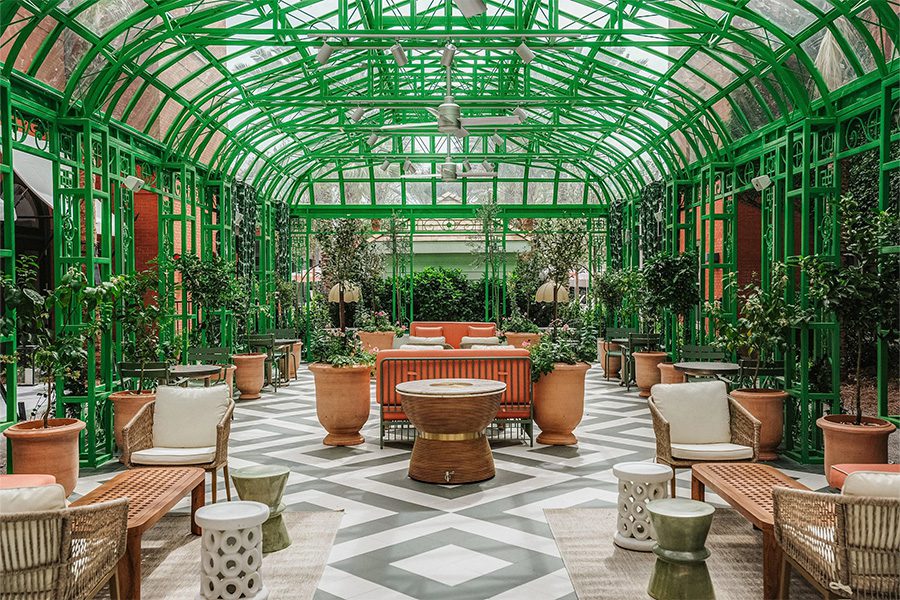Delta walks back modifications to its loyalty program, the hospitality industry offers aid to migrants in Chicago, and climate change is altering how we travel. All that and more in this week’s Five on Friday.
High-end architecture embraces its curves

The Water Drop Library in Huizhou, China, designed by 3andwich Design / He Wei Studio; photo by Jin Weiqi
In a marker that signals luxury, high-end building design is increasingly featuring curving forms—results that are more difficult for architects to achieve than other styles, Fast Company writes. “There’s an interest in things that are seemingly more complicated to produce,” London designer Ben Allen told the outlet. “Curves require time and effort,” including custom work that often requires local labor to produce. But these sinuous shapes become dramatic architectural focal points, drawing attention and creating showstopping results. During a time where much building design feels manufactured and predictable, the piece argues, the flourishes “have become the ultimate marker of taste and opulence.” (Related: China’s Sumei Skyline Coast Boutique Hotel boasts undulating forms)
Delta promises SkyMiles updates following backlash

Photo courtesy of VanderWolf Images/Adobe Stock
Delta Air Lines CEO Ed Bastian acknowledged that the company “probably went too far” with recently announced changes to its SkyMiles program, according to CNBC. The loyalty program overhaul, set to take effect in 2024, would make it more expensive to earn elite status and reduce customers’ access to Delta’s airport lounges. The airline has been contending with a surge in its upper-tier travelers related to increased spending post-pandemic, leading to a doubling in the number of its Diamond Medallion status members. “It’s gotten to the point, honestly, where we have so much demand for our premium product and services that are far in excess of our ability to serve it effectively in terms of our assets,” Bastian said. But the updates were met with swift backlash from customers, and will release modifications to the changes in the coming weeks.
Climate change is also changing how we travel

The Parthenon on the Acropolis in Athens, Greece, which closed to tourists during a heatwave this summer; photo courtesy of Adobe Stock
It won’t come as a surprise to anyone who vacationed over the summer that the way we travel is being impacted by the weather extremes associated with climate change. From wildfires in Greece and Maui to extreme temperatures (July set the record for the hottest month on Earth) and increased air turbulence, travelers must adjust their plans and expectations, tourism writer Paige McClanahan asserts in The New York Times. People and agencies are taking different strategies to cope: The Acropolis in Athens closed during midday in July, while pools and parks in other major cities stayed open as late as midnight during heatwaves; some cities are instituting “chief heat officers” to alert the public and oversee creation of cooling centers; tourists are planning their sightseeing trips around the hottest parts of the day (or avoiding summer travel altogether); and low water levels have forced operators to cancel river cruises on Europe’s Rhine, Danube, and Elbe rivers. Ultimately, travelers “are keenly aware that things are different now,” Henry Harteveldt, a travel analyst at Atmosphere Research Group, told McClanahan. “And you cannot just plan a trip without doing some research and having some level of awareness about your destination and potential risks.”
Chicago’s migrant community gets a helping hand from hospitality workers

Photo courtesy of Adobe Stock
Chicago restaurateurs and organizations, including Faraz Sardharia, who owns three eateries in the city, are banding together to help provide meals and other resources to the more than 14,000 migrants—mostly people from South America—who have arrived in the city over the last year, Eater reports. Sardharia is a board member of nonprofit Chi Care, which launched during the pandemic, and has partnered with the city and the Greater Chicago Food Depository to distribute 250,000-plus meals. They are now providing nearly 5,000 per day and aiming for culturally appropriate menu items. Many migrants are allowed to sleep in police stations overnight, but must remain outdoors during the day, meaning that the upcoming Chicago winter will force them into brutal conditions. Felipe Ospina, a former asylum seeker who arrived in the city more than 20 years ago and now works for Sysco, is working with his company, Chicago Public Schools, Chicago Chefs Cook, and Todos Para Todos on a winter clothing drive for children. Local restaurants are drop-off points for donations. “Where I came from, you’re used to this—you see speed bumps everywhere,” Ospina says. “You just find a way around it.”
Celebrate this year’s Gold Key finalists during BDNY

The BAR Studio-designed Capella Sydney in Australia, a finalist in the Gold Key Awards; photo courtesy of Capella Hotels & Resorts
HD’s sister brand Boutique Design has announced the finalists of the 43rd Gold Key Awards. The 2023 Gold Key judges selected the projects from more than 400 submissions from design firms and hospitality brands around the globe. Winners in 22 categories, as well as the Judges’ So Cool award winner and the Design Firm of the Year, will be revealed during a ceremony on November 13th at Cipriani 42nd Street in New York, held in conjunction with BDNY. The event also celebrates Boutique Design’s 2023 Boutique 18 class and Up-and-Coming Hoteliers of the year. Purchase tickets for this not-to-miss event, and make sure to register for BDNY while early rates still apply!



